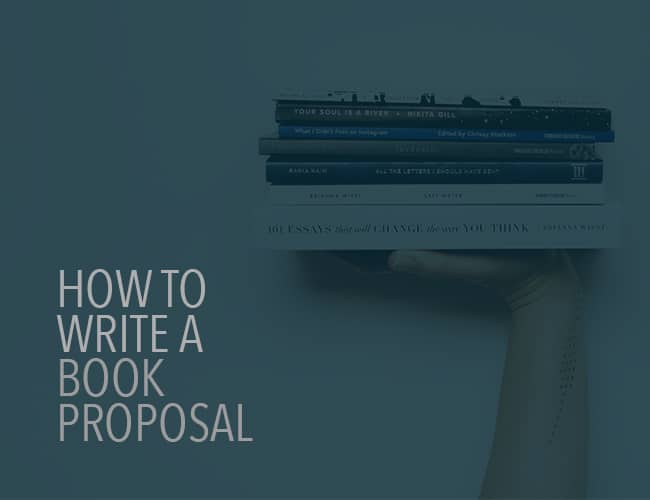If you're like most writers I hear from, you're probably wondering how to sell your book to a publisher. Publishing is a strange and mysterious industry, and it can be very hard to find your way through it to achieve your writing goals. You're in the right place though, because often, the very first step on your journey to publishing your book is learning how to write a book proposal.

How to write a book proposal, though? In this article, we're going to talk about how to write a book proposal for both nonfiction and fiction writers. We'll also look at when you need to write one. And at the end, there will be a fun exercise that will help you get started writing your book proposal.
Why Write a Book Proposal?
If you want to get a traditional book publishing deal, meaning your book would be published by a major publisher, you need a book proposal. This is true whether you're writing fiction or nonfiction.
Learning to write a good book proposal is one of the best things you can do to grasp the business of publishing and learn how to sell your books.
Here's what my own experience writing book proposals has looked like:
- More than 12 book proposals written, across my own projects and ghostwriting clients.
- Five books sold to publishers and several more are currently in process.
- $300,000+ in advances.
None of this would be possible if I hadn't first learned how to write a great book proposal. And as I've gotten better at writing them, the success of each project I've worked on has gone up, too.
When Do You Need to Write a Book Proposal?
Depending on whether you're writing fiction or nonfiction, you may need to write the proposal before you finish your book or after you finish your book
Write the Proposal BEFORE You Finish Your Book:
- You're writing nonfiction of the self-help/business variety (e.g. not a memoir).
- You're Stephen King or another very famous novelist.
Important: if you're writing a nonfiction book, then you write the proposal BEFORE you finish writing the book. In fact, publishers will look at it as a red-flag if you've already finished the manuscript because they want to be part of shaping it (so if you have finished, just don't tell them that).
This is also because most important part of selling your nonfiction book won't be the writing. It will be your platform and marketing plan (which means if you don't have an author website yet, you need one).
Write the Proposal AFTER You Finish Your Book:
- You're writing a novel.
- You're writing a creative memoir.
I wrote most of my book proposals before finishing the book because I was writing nonfiction books for ghostwriting clients. For my travel adventure memoir, I wrote the proposal after finishing the book because it's a creative memoir.
The 10 Book Proposal Elements
One of the difficult things about writing a proposal is that everyone does it a little differently.
I've read three books about writing book proposals and also the proposal guidelines by several literary agents. Each one has a slightly different template.
However, nearly all of them contain the following ten elements, even if they each put them in a different order or give them different names.
1. Title Page
The title page contains:
- Working title
- Working subtitle
- Author name
- Date (some literary agents/proposal templates leave this out)
2. Premise/One-Sentence Description
Describe your book in the form of a one sentence premise.
Here's our guide on how to write an effective premise.
3. Overview/Synopsis/Half-Page Description
Describe your book in a 3–6 paragraph overview or synopsis.
Note: Different proposal templates have different names and formats for this. Some break the book up into sections with descriptions of each section. Others expect a synopsis (especially for fiction writers). But all of them expect about 3–6 paragraphs of description.
4. Chapter Outline and Summaries
Outline your book with one paragraph of summary for each chapter.
5. Author Bio
Describe your background and any previous writing you've done. This should not be a life history, but rather a description of why you have authority with your target market.
6. Comparable Books
Three to four similar books that were both successful in the marketplace and were published recently. Shoot for titles published in the last three to five years.
7. Target Market Description
Describe the demographics and reading tastes of your target market or markets. Describe the demographics and reading tastes of your target market or markets. This is a kind of market analysis. Who are your potential readers?
A publisher will look at this to know whether you know who your readers are and why they will want to purchase your book.
8. Platform and Marketing
Describe your author platform, in other words, the size of your audience and why you have authority with them (i.e. why they listen to you and will buy your book).
This is an extremely revealing section of the proposal, because it shows how prepared you are to publish your book. Contrary to popular belief, even major publishers expect you to promote your own book. That means you should have an audience before you get published, especially if you're writing nonfiction.
And if you don't already have an audience, this is something you should work on before you send your proposal to agents and publishers.
You don't have to have a fully fleshed out marketing plan as a first time author, but if you don't have an email list or a following on social media, it's worth it to begin those steps to make sure you're connecting with your target audience.
9. Endorsements*
List the names of influencers and other authors who would be willing to endorse your book. Ideally, you would already know most of the people on this list.
*Sometimes this is included in the platform and marketing section.
10. Two Sample Chapters
Agents and potential publishers don't need to see the entire book to know if a book idea has a place in the market. You're sending two chapters to give them a sense of the tone of the book and the quality of your writing.
These don't have to be the first chapters in your book, although usually they are.
Keep in mind that a book proposal is separate from a query letter. The query letter is more like a cover letter. Some agents and publishers will only want a query letter first. Others will ask for the query letter and proposal. Whatever format or process they request, follow the submission guidelines.
Writing a Great Book Proposal Is How to Sell Your Book to a Publisher
It takes me months to finish writing a book proposal. In fact, for my travel adventure memoir, I've been working on the proposal on-and-off for the last two years, and even then, my agent is asking for a rewrite.
All that's to say, writing a great book proposal is hard!
But if you can get good at it, if you want to become a published author, this is a skill you need to learn.
At The Write Practice we believe that everyone has the ability to become a successful, published author. That means, we also believe you have the ability to write a great book proposal … with a lot of practice, of course.
Let's practice together.
Have you ever written a book proposal before? How did it go? Let us know in the comments section.
PRACTICE
Get started writing your book proposal now by crafting your book's premise.
If you're writing fiction or memoir, write a single sentence introducing us to your protagonist, the setting, and the crisis/antagonist/challenge the protagonist must face.
If you're writing nonfiction (not memoir), write two to three sentences to show us the problem you're solving and the solution you propose.
Remember, this is a book proposal, not back cover copy. Don't be afraid to spoil the story!
Take fifteen minutes to write. When you're done, share your premise in the Pro Practice Workshop. And if you share, be sure to leave feedback for your fellow writers! Which premises make you want to read their books?
Joe Bunting is an author and the leader of The Write Practice community. He is also the author of the new book Crowdsourcing Paris, a real life adventure story set in France. It was a #1 New Release on Amazon. Follow him on Instagram (@jhbunting).
Want best-seller coaching? Book Joe here.




0 Comments